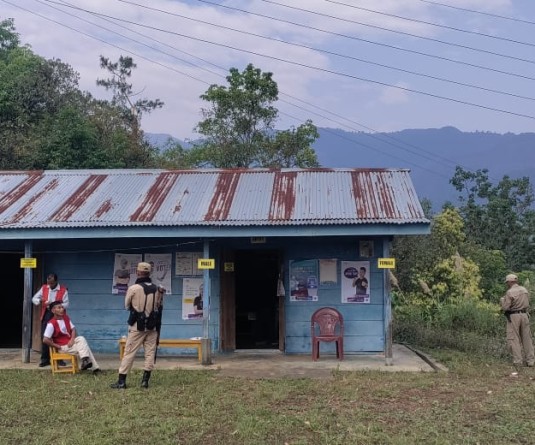
A young boy leaps in the air as he plays with a ball. Evan Bailyn reminds us: Childhood is the source of our imagination, our hope, and first treasured memories. (Photo by Ato Lemanghu)
‘We do not often realize that we are part of human trafficking’
One wintry Kohima morning, the sun was yet to rise from its sleep and the sky had not cleared from the cold night. The entire town seemed asleep, as most stayed within the warmth of their homes. All but few dared to tread in the freezing cold. As the bitter chill bit through the air, wearing nothing but an old school sweater and worn out pants with a basket on his head, was a boy not more than seven to eight years old. Probably on his way to fetch water, he dragged his cold feet as he stared down at the ground with a lost forlorn look. He stood out among the few morning joggers, a small little figure shivering in the frosty winter morning as his breath fogged the air around him. He is the face of countless children that we see every day. Children, who work in our homes, cook and clean for us, some even as young as four or five years old.
“We do not often realize that we are part of human trafficking, we bring children from border areas and from various villages of the mostly eastern areas. We bring them to help us in our domestic work with the promise of providing them education. But, sometimes and in some cases these children are not properly treated”, says Rev. Narola, Women Secretary, Nagaland Baptist Church Council. Most often, we seem to forget that these so called ‘domestic help’ are just children. We expect them to do the same work as an adult, with their tiny little hands and very small undeveloped body.
These children know that they do not have the same luxury as other children, the luxury to be a ‘child’. Once, while passing through a government primary school, some children were playing on the branch of a small tree. Somebody warned them that the branch will break and they will fall and hurt themselves. They quickly responded saying that, “It does not matter because we are just people’s servants.”
One must seriously question whether these children brought as domestic help under the veil of providing education is in fact a form of human trafficking and, thereby, a violation of human rights. It is time to examine how certain forms of structural oppression that are direct violations of human rights have become normalized in our society. Clearly, we justify our stance on domestic helpers in our homes by providing them with clothes, food and education.
Rather the question is whether we are contributing to the loss of their childhood. The naïve wonder of innocence that a child holds in his eyes is no longer there. It is replaced by the mature understanding that he is no longer a child because he cannot engage as a child in his own life, being loved, nurtured, playing, growing and treasured.




